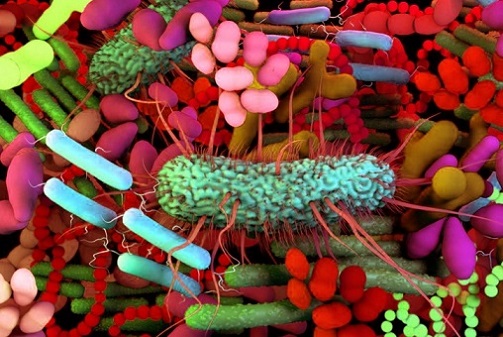Nikhil Prasad Fact checked by:Thailand Medical News Team Apr 12, 2025 19 hours, 58 minutes ago
Medical News: Scientists Investigate Bacterial Role in Colorectal Cancer
A new study by researchers from the University of Belgrade’s Faculty of Medicine and the University Clinical Centre of Serbia has shed light on how certain bacteria may contribute to the onset and progression of colorectal cancer (CRC). Colorectal cancer is one of the leading causes of cancer-related deaths worldwide, and understanding its triggers could help in developing better diagnostic and preventive strategies.
 How Microorganisms May Influence Colorectal Cancer Development
How Microorganisms May Influence Colorectal Cancer Development
This
Medical News report highlights a comprehensive analysis of microorganisms found in the colon, revealing a potential connection between bacteria and cancer development. The study’s findings suggest that some bacteria might promote tumor growth, while others could potentially suppress it.
The Study’s Approach to Understanding Bacteria and Cancer
The researchers examined 44 patients diagnosed with colorectal cancer. During their surgeries, three different tissue samples were taken for microbiological analysis: one from healthy colon tissue, another from the surface of the tumor, and a third from deep inside the tumor tissue.
The samples were analyzed to identify the types of bacteria present and whether their presence changed from healthy tissue to tumor sites. This approach allowed researchers to determine which bacteria might be associated with cancer progression and which ones might play a protective role.
Key Findings on Bacteria in the Colon
The analysis identified several types of bacteria in the different tissue samples. Among the most prominent findings:
-
Escherichia coli (E. coli) was the most prevalent bacterium, found in 70.5% of healthy colon tissue, 72.7% on the tumor surface, and 77.3% deep within the tumor. Some strains of E. coli produce toxins that can damage DNA and promote cancer growth.
-
Enterococcus spp. was detected in 47.7% of healthy tissue, 40.9% on tumor surfaces, and 47.7% within tumors. These bacteria are part of the normal gut flora but may contribute to cancer development by increasing inflammation.
-
Klebsiella/Enterobacter species were present in 20.5% of healthy tissue, increasing to 25% on tumor surfaces and 27.3% in the tumor center. These bacteria are known for their ability to resist antibiotics and cause infections.
-
Pseudomonas aeruginosa was found in 13.6% of healthy colon samples but increased to 20.5% on tumors and 18.2% within tumor tissues. Interestingly, some research suggests this bacterium may have cancer-fighting properties.
-
Streptococcus gordonii, a common oral bacterium, was found in about 10% of cases across all tissue types, raising questions about whether bacteria from the mouth could migrate and influence colorectal cancer.
What These F
indings Mean for Cancer Prevention
The study suggests that monitoring gut bacteria could play a role in colorectal cancer prevention. The presence of certain bacteria in higher numbers within tumors indicates a possible link between microbiome changes and cancer progression.
One of the most important takeaways is that an imbalance in gut bacteria, known as dysbiosis, may contribute to cancer development. Regular stool analysis to detect harmful bacterial overgrowth could serve as an early warning sign for colorectal cancer, potentially leading to earlier interventions and better outcomes for patients.
Could Bacteria Be Used for Cancer Treatment
The research also raises the possibility of using bacteria-based treatments. If specific bacteria contribute to cancer, targeting them with probiotics, antibiotics, or dietary changes could become a future prevention or treatment strategy. On the other hand, if some bacteria help suppress tumor growth, harnessing their beneficial properties could lead to innovative new therapies.
Conclusion
This study provides valuable insights into how microorganisms in the gut may contribute to the development of colorectal cancer. While bacteria like E. coli and Enterococcus spp. appear to encourage cancer progression, others like Pseudomonas aeruginosa might have the potential to fight it. The findings highlight the importance of maintaining a balanced gut microbiome and suggest that regular stool testing could help detect early warning signs of colorectal cancer. Future research could focus on how altering gut bacteria through diet, antibiotics, or probiotics might reduce the risk of developing colorectal cancer.
The study findings were published in the peer-reviewed journal: Life.
https://www.mdpi.com/2075-1729/15/3/468
For the latest on Colorectal Cancer, keep on logging to Thailand
Medical News.
Read Also:
https://www.thailandmedical.news/news/gut-dysbiosis-and-chronic-inflammation-in-long-covid
https://www.thailandmedical.news/news/ketogenic-diets-can-cause-liver-damage-and-gut-dysbiosis
https://www.thailandmedical.news/news/microbiota-dysbiosis-and-serotonin-dysregulation-linked-to-long-covid-gastrointestinal-symptoms
https://www.thailandmedical.news/articles/hospital-news
https://www.thailandmedical.news/pages/thailand_doctors_listings
